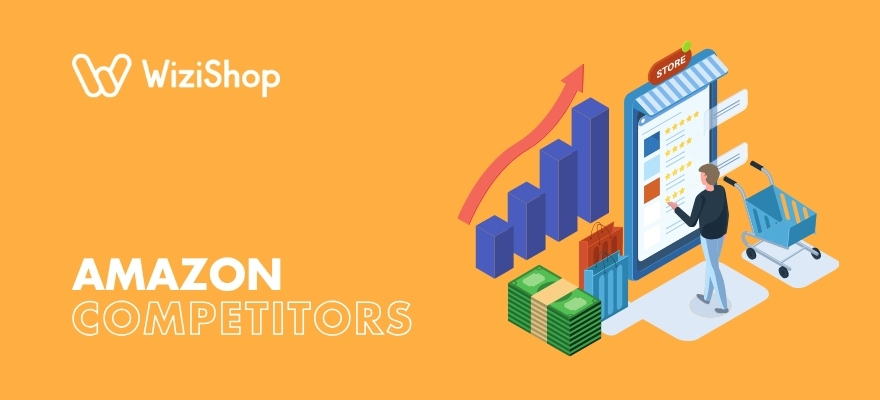Key points in this article:
- Amazon competitors include global marketplaces, regional ecommerce platforms, and niche specialists.
- Traditional retail giants like Walmart and Target have expanded their online offerings to directly challenge Amazon’s ecommerce dominance in key markets.
- Regional leaders such as Alibaba, Mercado Libre, Shopee, and Lazada leverage localized strategies and ecosystems to compete effectively against Amazon in Asia and Latin America.
- Companies such as Netflix and Disney+ compete with Amazon specifically in the digital streaming space, highlighting that competition spans beyond traditional ecommerce.
- Individual online stores created by ecommerce entrepreneurs pose competition to Amazon by offering unique, branded experiences and niche products that large marketplaces often don’t focus on.
Buying and selling on the internet have changed dramatically since online shopping was created. Year after year, new brands head online to launch an ecommerce website and sell their products, with each business achieving various levels of success in attracting customers and generating sales.
When it comes to ecommerce today, however, there’s no doubt that Amazon is a colossus among a vast array of businesses, dominating the online retail market with its extensive selection, global presence, convenient buying experience, and rapid delivery services.
However, this digital giant faces stiff competition from a diverse array of contenders, including eBay, Walmart, Alibaba, Rakuten, Target, and other competitors, with each business carving out its own niche and challenging Amazon’s supremacy in unique ways.
From established retail businesses venturing into the web realm to innovative startups revolutionizing how we shop, the battle for dominance in internet commerce is fiercely contested.
In this article, we will share a list of the top Amazon competitors around the world, highlighting how each company differentiates itself, has found success catering to specific customer needs, and poses a significant challenge to Amazon’s reign in the digital marketplace.
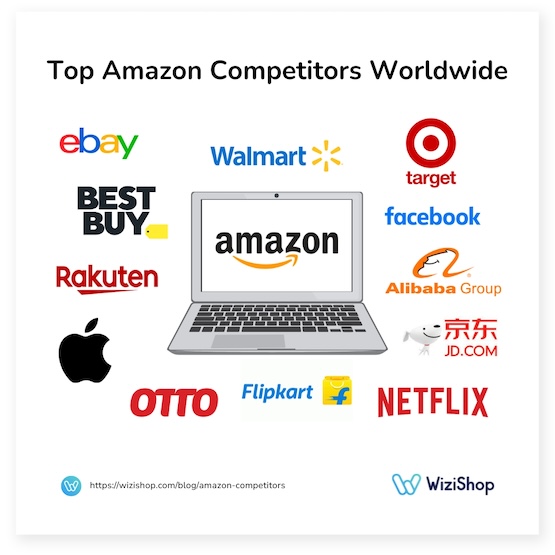
1. eBay

First on our list of Amazon’s main competitors is eBay, an online auction and shopping platform headquartered in San Jose, California, which launched in 1995, emerging around the same time as Amazon.
However, Amazon’s growth trajectory was much steeper compared to eBay’s more gradual expansion. What’s more, eBay’s focus on merely facilitating a marketplace for users, without delving into logistics services, results in a smaller user base compared to Amazon's.
As one of today’s top ecommerce sites, eBay has carved a niche for itself in the market with its auction-centric approach, becoming a favored website for consumer-led transactions and earning revenue of $10.28 billion in 2024.
Many of the items listed on eBay are similar to those available on Amazon. That being said, eBay sets itself apart as a formidable competitor by enabling sellers to auction items or set a fixed price, an option not available on Amazon.
This approach has made eBay a go-to platform for a variety of items, including fashion, apparel, fitness equipment, jewelry, tech gadgets, and other products.
2. Walmart

Established in 1962 by Sam Walton in Rogers, Walmart stands as the most seasoned among Amazon’s rivals. Boasting a global presence with more than 10,800 stores worldwide, Walmart has undoubtedly secured its status as a powerhouse in the retail sector.
Moreover, Walmart has ventured into the internet selling realm with its swiftly growing Walmart Marketplace, positioning itself as a strong competitor to Amazon, particularly when it comes to ecommerce in the US.
Both Amazon and Walmart rank as the premier retailers within the US, engaging in a continuous battle for market supremacy. While Walmart has a stronghold over brick-and-mortar retail, Amazon is the frontrunner in the digital domain.
Despite its primary emphasis on brick-and-mortar operations, Walmart continues to channel investments into technology, development, and marketing efforts to bolster its online footprint.
When it comes to logistics, for example, Walmart challenges Amazon with its Walmart Fulfillment Services (WFS), providing fast two and three-day shipping options that give Amazon a run for its money.
In fact, Walmart’s total 2024 revenue (from both online and offline channels) reached $648.13 billion, outpacing Amazon’s revenue of $637.96 billion for the same year.
3. Alibaba Group

Alibaba, one of the best known Amazon competitors, was founded by Jack Ma in 1999 and is a globally renowned Chinese digital commerce giant. Unlike Amazon, which operates through country-specific divisions, Alibaba maintains a significant global presence without regional subdivisions.
Amazon is recognized as a titan in the U.S. market, but in China, the Alibaba Group holds a similar stature, earning $130.35 billion in revenue in 2024.
A good example of this major Amazon competitor’s strength in the web commerce sector is that it successfully ousted eBay from the Chinese market in 2014, a testament to its deep understanding of consumer needs and commitment to ongoing innovation.
The Alibaba conglomerate encompasses various entities such as Taobao, AliExpress, Tmall, and Alibaba Cloud. Each arm of Alibaba serves distinct purposes to ensure a comprehensive shopping experience.
Taobao caters to B2C transactions, Tmall focuses on C2C interactions primarily within China, AliExpress targets international consumers, and Alibaba Cloud involves cloud computing positioning itself as a direct competitor to Amazon Web Services.
4. Flipkart

Flipkart, an influential ecommerce platform established in 2007 by two ex-Amazon employees, is one of the most popular web commerce sites in India.
In 2018, the American retail giant Walmart secured a 77% majority interest in Flipkart with a $16 billion investment, placing Flipkart's valuation at approximately $20 billion. Like Walmart, Flipkart is committed to promoting numerous Indian brands, thereby enhancing customer loyalty.
While Flipkart's operational model closely mirrors that of Amazon, offering an extensive selection of products and services, it sets itself apart with the Flipkart Plus SuperCoins rewards program, which is earned by customers rather than purchased, unlike Amazon Prime.
Furthermore, although Amazon India topped the list of Indian internet marketplaces in terms of monthly visitors as of March 2024, attracting over 295 million monthly visitors, Flipkart came in second place, bringing in over 167 million monthly visitors for the same period of time.
5. Rakuten

Founded in 1997 and based in Tokyo, Japan, Rakuten is often referred to as the “Amazon of Japan.” This company mirrors Amazon’s business model and generated $15.04 billion in revenue in 2024.
The key to Rakuten’s dominance in the Japanese market lies in its focus on customer loyalty, offering exclusive rewards like point tracking, which allows shoppers to earn points and redeem them for discounts.
Beyond being a traditional marketplace, Rakuten has forged alliances with leading internet commerce enterprises, providing over 70 services that compete with Amazon in multiple domains.
For instance, Rakuten has diversified its offerings to include video streaming (Rakuten TV), its own payment gateway, and even ventures into health and life insurance, positioning it as a distinct and formidable competitor to Amazon both in Japan and globally.
6. Target

Target, sharing its inception year with Walmart, was established in Minneapolis, Minnesota. The company identifies itself as a "general merchandise retailer" and maintains a widespread network of over 1,950 stores in the US, declaring that 75% of Americans reside within 10 miles of a Target store.
Although Target may appear to be a minor contender in the marketplace compared to other Amazon competitors, its potency lies in cultivating a dedicated following.
An effective loyalty and rewards initiative along with the proprietary REDcard credit card enhance Target’s potential to rival giants like Amazon and Walmart, with the company earning $107.41 billion in revenue in 2024.
Embracing the digital marketplace, Target has enhanced its internet commerce footprint by introducing services like same-day delivery, order pickup, and drive-up collection options. By prioritizing online sales, Target is gradually capturing a portion of Amazon’s market dominance.
7. Best Buy
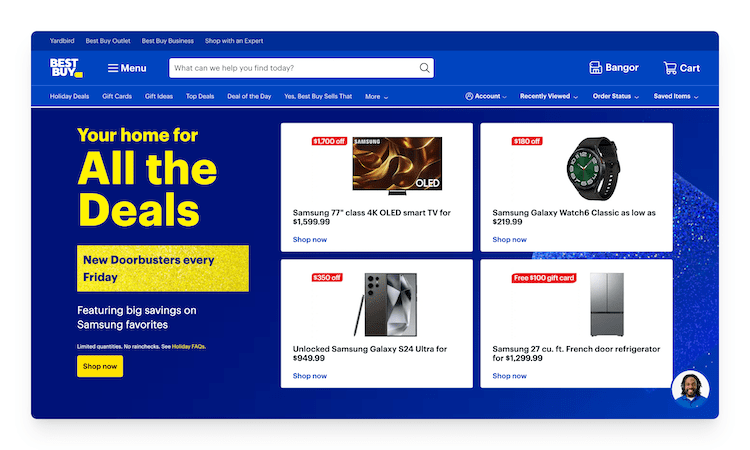
Best Buy has carved out a significant niche for itself as one of the major Amazon competitors in the technology sector.
The business is based in Richfield, Minnesota and was established by Richard M. Schulze and James Wheeler in 1966, initially operating as an audio specialty store named Sound of Music.
In 1983, the company underwent a rebranding to its current identity, shifting its focus towards a broader range of consumer electronics.
Known for its strong brand, Best Buy has seen great success as a global online retailer, with revenue of $41.52 billion in 2024. In addition, it has a deep understanding of the retail market, especially in technology products.
Beyond matching Amazon in sales, Best Buy stands out for its exceptional tech-centric customer service.
The company has launched a subscription service called My Best Buy Total, which, for $179.99 per year, offers customers round-the-clock tech support, VIP member support, a 20% discount on repairs, and more.
8. Facebook

Facebook is another one of Amazon’s main competitors due to its vast user base and the social network’s global reach.
Leveraging Facebook’s extensive social media platform, Marketplace facilitates direct peer-to-peer selling and buying within local communities or across broader regions, with more than 1 billion shoppers visiting Facebook Marketplace each month.
It offers a special advantage by allowing users to view sellers’ profiles, fostering trust and community engagement.
While the platform was predominantly used by individuals to sell their second-hand items, the company has expanded its offerings by introducing Facebook Shops. This feature allows digital commerce companies to create their own digital storefronts on Facebook, enabling them to sell products directly through the platform.
With Facebook Shops, brands enjoy a distinctive opportunity to showcase their merchandise, engage with customers through Messenger, and execute Facebook advertising campaigns, all within a single platform.
9. Apple

Founded by Steve Jobs, Steve Wozniak, and Ronald Wayne in 1976, Apple stands as one of Amazon’s top competitors, primarily due to its stronghold in the technology and consumer electronics market, generating $391.04 billion in revenue in 2024.
Unlike Amazon’s diversified product range, Apple focuses on high-end, premium devices such as iPhones, iPads, MacBooks, and its ecosystem of services including iCloud, Apple Music, and the App Store.
Apple’s emphasis on innovation, quality, and user experience, along with its loyal customer base, positions it as a major player in segments where Amazon also competes, such as streaming services, smart home devices, and digital content.
The brand’s global presence and reputation for excellence make it a formidable rival in these overlapping markets.
10. JD (JingDong)

JD, also known as JingDong (and formerly named 360buy), is one of the largest online retailers in the world, represents another one of Amazon’s strongest competitors in China, and is also a major rival of Alibaba’s Tmall, with both operating as B2C (business-to-consumer) marketplaces.
Founded by Liu Qiangdong in June 1998, the company launched its retail platform online in 2004.
While it initially began as an online store for magneto-optical products, it quickly augmented its offerings to include electronics, mobile phones, computers, and related goods.
By tailoring its approach to the Chinese market and featuring unique deals exclusive to its platform, such as bulk purchasing similar to Costco's model in the US, JD has successfully increased its profitability, earning $158.76 billion in revenue in 2024, up by 3.92% from the previous year.
11. Otto
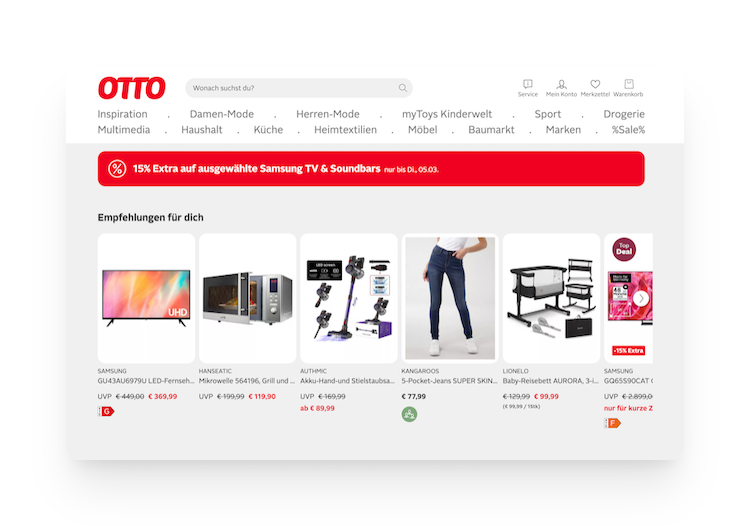
Otto, established in 1949, is a veteran German online retailer based in Hamburg and founded by Werner Otto.
Otto initially took orders via mail, with the company later transitioning to telephone-based orders before embracing online retail in 1995, entering the US market in 1998 by purchasing a share in Crate & Barrel, a furniture retailer based in Chicago.
Regarded as a comprehensive source for electronics, fashion, and sporting goods, Otto’s primary market, especially within Germany, lies in the furniture and home decor sector.
Even with Amazon’s substantial footprint in Europe and Germany, Otto has successfully maintained its market relevance, securing its position as one of the top marketplaces in Germany, coming in second place to Amazon.
12. Netflix

Netflix and Amazon don’t compete across all product lines but specifically in the realm of digital streaming.
Founded by Reed Hastings and Marc Randolph in 1997, Netflix, Inc. started out as an innovative DVD-by-mail movie rental service. Less than 10 years later, Netflix as a video-on-demand streaming provider was launched.
Today, the platform is one of the world’s most favored subscription services, boasting 325 million paid subscriptions across over 190 countries as of 2026, and is one of the top competitors of Amazon’s streaming service, Prime Video.
In terms of monthly traffic, Netflix.com takes the lead in the US, generating 412.83 million visits in January 2024 compared to Amazon Prime Video’s 13.46 million visits for the same period.
Furthermore, concerning revenue, Netflix earned $39 billion in revenue in 2024, compared to Amazon Prime Video earning $13.5 billion.
It’s clear that Netflix’s significant subscriber base and its extensive selection of video content solidify its status as a formidable rival to Amazon in the streaming arena.
13. Cdiscount
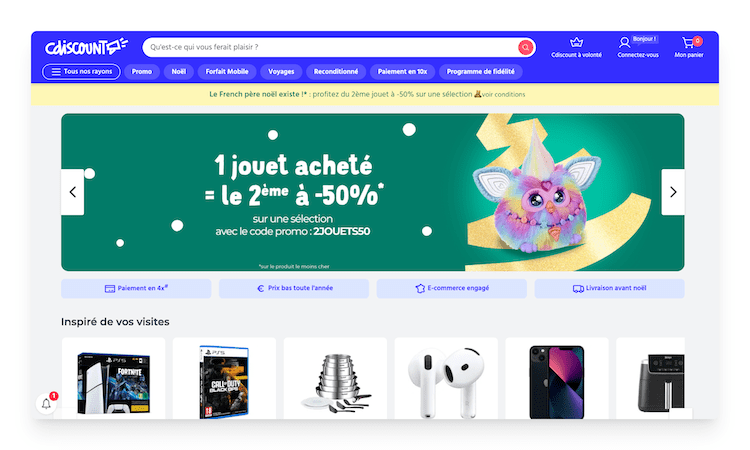
Cdiscount is a leading French internet commerce platform selling a wide range of products, including electronics, home appliances, furniture, fashion, and groceries. Known for its competitive pricing and frequent discounts, it appeals to budget-conscious shoppers.
A key advantage of Cdiscount is the company’s extensive product catalog tailored to French consumers, often including localized product offerings like wine, regional foods, and French brands.
Cdiscount competes with Amazon by emphasizing customer loyalty through its "Cdiscount à Volonté" subscription, which provides benefits like free express shipping and cashback offers.
The business also leverages its physical presence, with collection points across France for convenient order pickups. In addition, Cdiscount frequently runs flash sales and bundles that attract deal hunters.
While Amazon surpasses it in scale and logistics, Cdiscount remains a strong competitor in France by blending local expertise, attractive pricing, and a focus on customer loyalty in its home market, generating €1.23 billion ($1.28 billion) in revenue in 2024.
14. Mercado Libre

Mercado Libre, founded in 1999 in Argentina, is Amazon’s biggest competitor in Latin America, operating in 18 countries including Brazil, Argentina, and Mexico.
The company’s comprehensive ecosystem encompasses online marketplaces, digital payments through Mercado Pago, and logistics services via Mercado Envíos, effectively addressing regional challenges such as limited banking access and complex infrastructures for product deliveries.
With this Amazon competitor’s deep understanding of local markets, it’s able to supply tailored solutions that resonate with Latin American consumers, helping the business to attract an estimated 100 million unique active buyers in 2024.
The integration of financial services, like offering credit to both buyers and sellers, has been pivotal in fostering financial inclusion and stimulating ecommerce growth in the region.
In competing with global giants like Amazon, Mercado Libre leverages its localized expertise and established infrastructure. The business’s extensive logistics network, including innovative delivery methods such as drones, ensures efficient service even for customers in remote areas.
Furthermore, Mercado Libre’s fintech arm, Mercado Pago, has become a dominant player in digital payments, further embedding website users within its ecosystem.
15. Tesco

One of the UK’s biggest supermarket chains, Tesco offers items like groceries, household goods, clothing, and financial services.
Its website, Tesco.com, extends its retail operations into the digital space with features like online grocery shopping, home delivery, and click-and-collect services.
Tesco’s strengths lie in its vast product range, strong brand loyalty, and extensive physical store network, which supports seamless online and offline integration. Its Clubcard loyalty program incentivizes repeat purchases, offering discounts and personalized deals.
The company spars with Amazon in the ecommerce world by leveraging its established infrastructure, particularly for grocery delivery.
Unlike Amazon, Tesco benefits from local expertise and a network of distribution hubs directly tied to its stores, ensuring quick delivery and fresh produce for customers to enjoy.
When it comes to net ecommerce sales in the UK, Tesco comes in 2nd place behind Amazon, generating approximately $7.22 billion in 2024, just ahead of Sainsbury’s.
The business’s competitive pricing and focus on customer convenience, combined with innovations like same-day delivery and subscription services like Delivery Saver, position Tesco as a strong contender against Amazon in the UK grocery and retail markets.
16. Wayfair
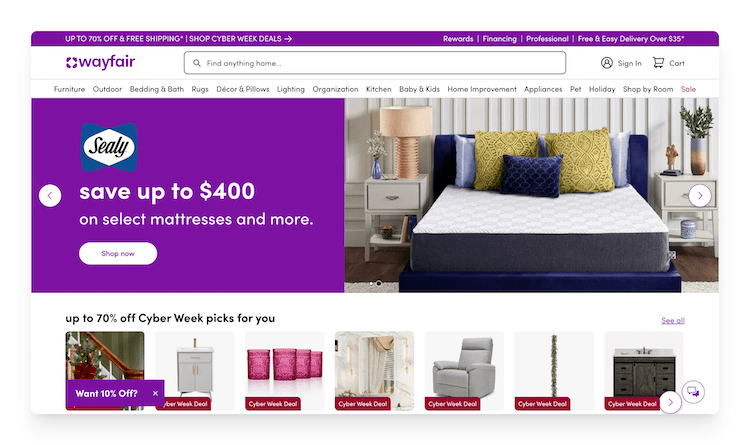
Wayfair is a major American ecommerce platform specializing in furniture and home goods, offering over 30 million items from more than 20,000 global suppliers.
The internet seller earned $11.8 billion in global revenue in 2024, with $10.3 billion of that sum coming from the US.
Some of the top reasons that consumers purchase from Wayfair are its extensive product range, robust online presence, and customer-centric approach.
The company’s innovative dropshipping model allows it to maintain a vast inventory of products without the overhead of physical warehousing, enhancing scalability and reducing costs.
In competing with Amazon, Wayfair differentiates itself by focusing exclusively on home furnishings and décor, providing a curated shopping experience tailored to these categories. This specialization enables Wayfair to offer a more personalized and comprehensive selection in its niche compared to Amazon's broader marketplace.
Furthermore, Wayfair’s commitment to customer service, including design consultations and specialized shipping options, aims to enhance the shopping experience beyond what Amazon typically offers in the home goods sector.
That being said, Amazon’s large resources, extensive distribution network, and competitive pricing present significant challenges.
To maintain its competitive edge, Wayfair continues to innovate in areas like augmented reality for product visualization and invests in logistics to improve delivery times, striving to provide unique value propositions that set it apart from Amazon in the online home goods market.
17. Lazada
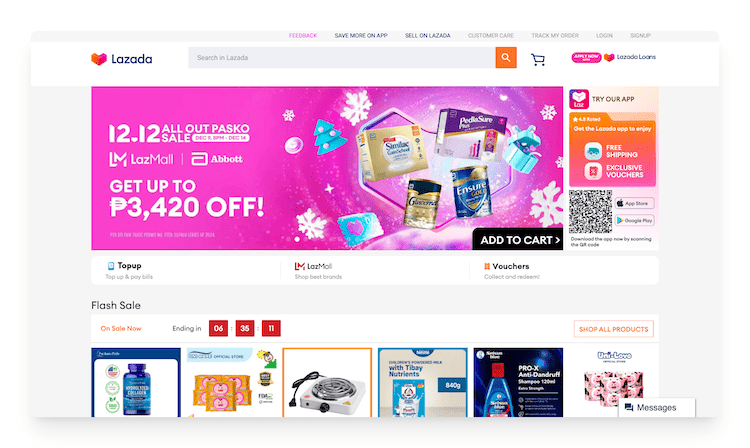
Lazada, started in 2012 by Maximilian Bittner with backing from Rocket Internet, is one of the biggest sites for internet commerce in Southeast Asia, operating in Indonesia, Malaysia, the Philippines, Singapore, Thailand, and Vietnam.
In 2016, Alibaba Group acquired a controlling stake in Lazada, bolstering its presence in the region.
Lazada’s strong points include a deep understanding of local markets, a large product selection, and tailored services like cash-on-delivery and localized payment options, catering to diverse consumer preferences.
The business’s logistics network and initiatives like LazMall, launched in 2018 to feature authentic brands, enhance customer trust and shopping experience.
Competing with Amazon, which has a limited presence in Southeast Asia, Lazada leverages its regional expertise and Alibaba’s resources to offer localized services and a user-friendly platform, generating revenue of $32.69 billion in 2024.
This strategic positioning enables Lazada to effectively address local consumer needs and achieve success in maintaining a competitive edge over Amazon in the burgeoning Southeast Asian ecommerce market.
18. Etsy

Etsy, created in 2005 by Rob Kalin, Chris Maguire, and Haim Schoppik, is an American internet commerce platform specializing in handmade, vintage, and craft items.
It’s grown into a global marketplace, connecting millions of creative entrepreneurs with buyers seeking unique products, bringing in $2.8 billion in revenue in 2024.
Etsy boasts an extensive catalog of artisanal goods, a strong community focus, and a user-friendly interface that encourages direct connections between buyers and sellers. This emphasis on unique, handcrafted items differentiates Etsy from mass-market retailers.
To compete with Amazon, particularly its Amazon Handmade section, Etsy uses its established reputation in the handmade and vintage market, offering a personalized shopping experience and a dedicated customer base.
The company continually enhances its platform with features like improved search functionality and seller tools to support its community.
Etsy’s commitment to maintaining a niche marketplace for unique and handcrafted items allows it to stand out in the competitive digital commerce landscape, attracting 8.1 million active sellers and 96.6 million active buyers worldwide in 2024.
19. OnBuy
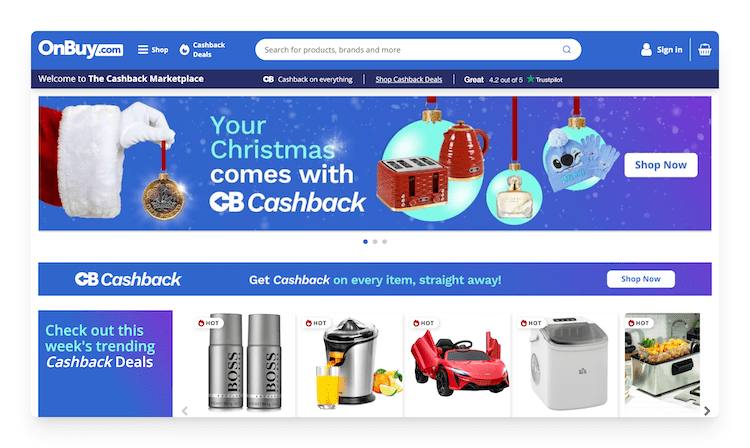
OnBuy, founded in 2016 by Cas Paton, is a UK-based web marketplace designed to offer a fair and transparent platform for both buyers and sellers.
In 2023, the FT 1000 list produced by the Financial Times ranked OnBuy as the fastest growing ecommerce business in Europe. In Q4 2024 alone, the company earned £44 million ($59.77 million) in revenue, representing growth of 37% compared to the same period a year earlier.
Unlike Amazon, OnBuy doesn’t sell its own brand of products, ensuring it doesn’t compete with its sellers. This approach fosters trust and collaboration, attracting a diverse range of retailers and brands.
OnBuy emphasizes supporting independent sellers and providing competitive pricing in order to compete with Amazon. Its UK focus allows for faster shipping times and tailored customer support, enhancing the shopping experience for local consumers.
In addition, OnBuy’s partnership with PayPal, established in 2018, offers secure payment options, further building customer confidence.
OnBuy’s commitment to not competing with its sellers and its focus on the UK market differentiate it from Amazon, appealing to consumers seeking a more localized and seller-friendly shopping experience.
20. Shopee

Similar to Lazada, Shopee is one of the leading internet shopping platforms in Southeast Asia and Taiwan, earning revenue of $100.5 billion in 2024.
Launched in Singapore in 2015 by Sea Limited, Shopee was initially a consumer-to-consumer (C2C) marketplace. It’s since evolved into a comprehensive platform offering a wide range of products across various categories.
Shopee differentiates itself through a mobile-first approach, integrating logistical and payment support to facilitate seamless transactions.
Features like Shopee Guarantee, which withholds payments to sellers until buyers confirm receipt, enhance trust and security.
Competing with Amazon, Shopee takes advantage of its thorough understanding of local markets, offering tailored experiences that resonate with regional consumers.
Its focus on mobile accessibility and localized services enabled it to become the most downloaded shopping app globally in 2021, surpassing Amazon.
21. Disney+
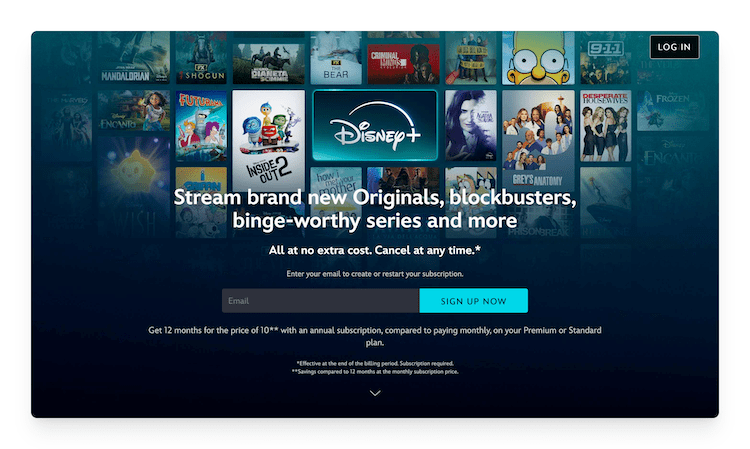
Disney+ is another one of Amazon's principal competitors when it comes to video-streaming companies.
Launched by the Walt Disney Company in November 2019, the video on-demand platform is available in 150 countries and offers a wide array of content, including movies, TV shows, and exclusive originals from Disney's brands such as Pixar, Marvel, Star Wars, and National Geographic.
Disney+ is a major competitor to Amazon's Prime Video due to its extensive library of exclusive, family-friendly content and franchises with massive fan followings.
Its affordable subscription model and international expansion further strengthen its position in the streaming wars, vying for viewers in a crowded market dominated by Amazon, Netflix, and others.
There are 132 million Disney+ subscribers around the world as of Q4 2025, a decrease of approximately 16.8% compared to the same quarter the previous year.
Looking at the US alone, Disney+ ranks fourth in the list of the most popular streaming platforms, coming in behind Amazon Prime Video, Netflix, and Max.
22. Temu

Known for offering products at very low prices, Temu, launched in September 2022 by PDD Holdings—the parent company of China’s Pinduoduo—has rapidly emerged as a significant player in global digital commerce.
Operating as an online marketplace, Temu connects consumers directly with manufacturers, offering a vast array of products at heavily discounted prices.
Its aggressive marketing strategies, including high-profile Super Bowl advertisements, propelled it to become the most downloaded shopping app in the US in 2024.
Temu’s business model emphasizes cost savings by shipping products directly from China, which results in longer delivery times but significantly lower prices. This approach appeals to budget-conscious consumers, positioning Temu as a formidable competitor to established ecommerce giants like Amazon.
Amazon has responded by launching “Haul,” a section within its platform offering low-cost items, to counter Temu’s growing influence.
The competition between Temu and Amazon highlights a shift in consumer preferences towards affordability, even at the expense of delivery speed, reshaping the dynamics of selling and buying on the internet.
23. Online stores
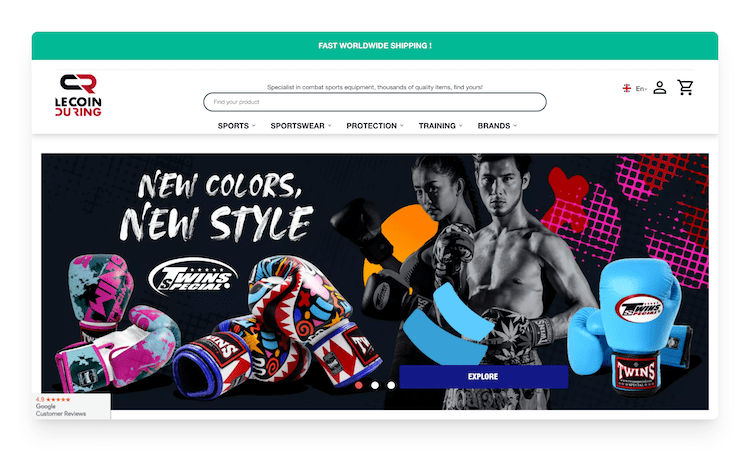
Source: Le Coin du Ring
Last on our list of Amazon competitors is a competitor that you may not have considered: the many online stores owned by ecommerce entrepreneurs all across the world!
Ecommerce growth has skyrocketed in recent years. In 2025, ecommerce made up 23.5% of total retail sales around the globe. Furthermore, worldwide retail ecommerce sales were predicted to reach over $3.6 trillion in 2025.
It should come as no surprise then that online stores, particularly those owned by individual brands, pose significant competition to Amazon due to their ability to offer one-of-a-kind, branded experiences directly to consumers.
These online sellers bypass traditional retail intermediaries, allowing for closer customer relationships, personalized service, and tailored marketing strategies.
The businesses often provide exclusive products, better control over inventory, pricing flexibility, and a distinct brand story that resonates with their target audience.
By leveraging ecommerce growth strategies involving social media, SEO, and other digital marketing channels, these individual online stores can reach a wide audience, challenging Amazon’s dominance by catering to niche markets and consumer preferences for authenticity and direct engagement with brands.
The great thing is that it’s easier than ever for you as an online seller to launch your very own online store, especially when using WiziShop, the AI-powered ecommerce solution!
With WiziShop, you will have the freedom to create an online store that matches the vision you have for your business, choosing from a vast array of design templates and availing of over 400 pre-integrated features to build your brand, promote the items you have for sale, and increase your conversion rate. More than 50 SEO optimizations await your website as well, which will help your store to climb the rankings on Google.
Each product you offer will distinguish itself through your marketing efforts, branding, and the unique features that transform your ecommerce website into a go-to destination for your dedicated customers. This approach enables your business to achieve further growth in the realm of online sales.
For example, you can create your own blog as part of your WiziShop subscription. You will also be able to take advantage of the boundless capabilities of the solution’s artificial intelligence, seamlessly integrated into your administration space, to produce any text you desire: blog posts, product descriptions, translations, FAQs, and more!
And if you’re a complete beginner when it comes to managing an ecommerce website? No worries!
With Wizishop, daily support is at your fingertips, thanks to a dedicated team of Business Coaches ready to assist you at every step of establishing your business. Then, Maia, a 24/7 chatbot, is always available to address any inquiries you may have about your WiziShop store or ecommerce topics in general, ensuring you have the help you need anytime, day or night.
Sign up today to enjoy a 7-day free trial!
Try WiziShop free for 7 days
THE EASIEST NO-CODE ECOMMERCE SOLUTION✅ No credit card required
✅ Access to all features
✅ No commitment


